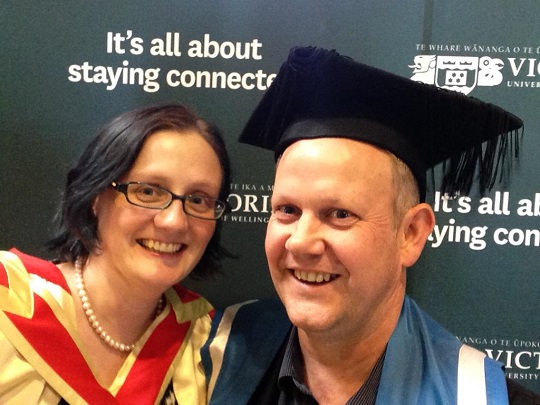First Master of GIS crosses the stage
Victoria University’s first ever Master of Geographic Information Science (GIS) was capped at yesterday’s graduation ceremony.
Victoria University’s first ever Master of Geographic Information Science (GIS) was capped at yesterday’s graduation ceremony.

Andrew Clouston, Geospatial Team Manager at Land Information New Zealand (LINZ), was the first graduate since the programme’s inception in 2012.
Carrying out his studies part-time was a challenge but well worth the effort, says Andrew.
“I was juggling my studies with full-time work, family and a commute from the Wairarapa. I received a great amount of support which enabled me to complete my Master’s in just over three years.”
Programme Director Dr Mairead de Roiste from SGEES says the programme attracts recent graduates and professionals like Andrew already in the workforce looking to upskill.
“A number of government departments, such as LINZ, have actively encouraged staff through sponsorship to take part in the programme. The programme benefits from a great richness of student experiences and perspectives, such as surveying in Andrew's case, conservation, education and consulting in others.”
Andrew’s thesis explored the issues of including citizen data collection or crowdsourcing in government datasets with a specific focus on the New Zealand Cadastre (the system responsible for recording land surveys and property boundaries information).
“In addition to being topical and relevant for New Zealand, the conversations generated as a result of his work have advanced New Zealand's thinking on how we can maintain our authoritative databases to a high international standard in light of changing technologies and expectations”, says Dr de Roiste.
The Master of GIS was introduced in response to a national geospatial skills shortage in a collaboration between Victoria University, the University of Canterbury and AUT.
“It’s a unique programme internationally. We make use of innovative technologies to join students and staff based at the three different institutions into the same courses and programme.
“The skills our students gain are invaluable – in fact we've had the unusual problem of a number of our students getting jobs before they've finished.”
